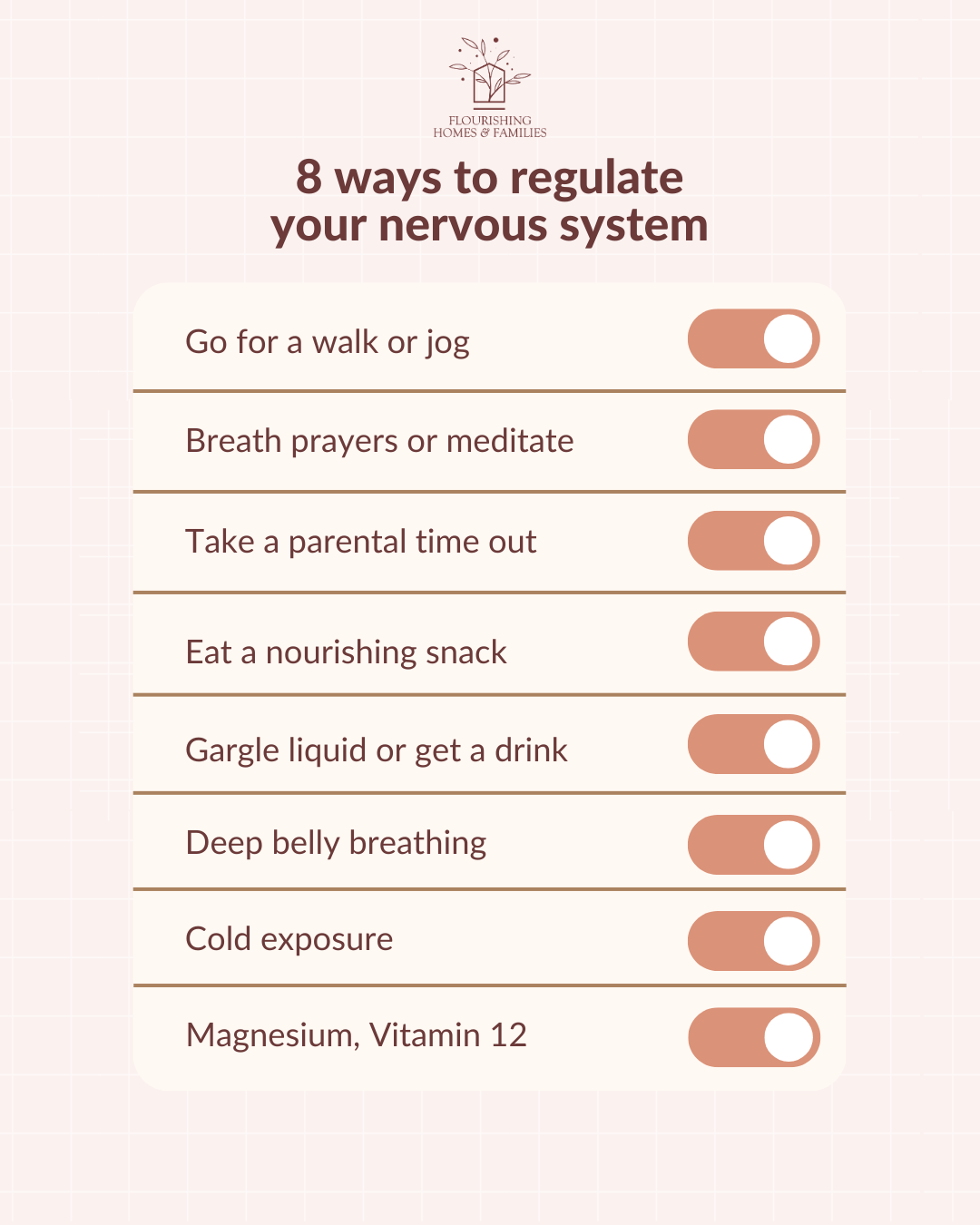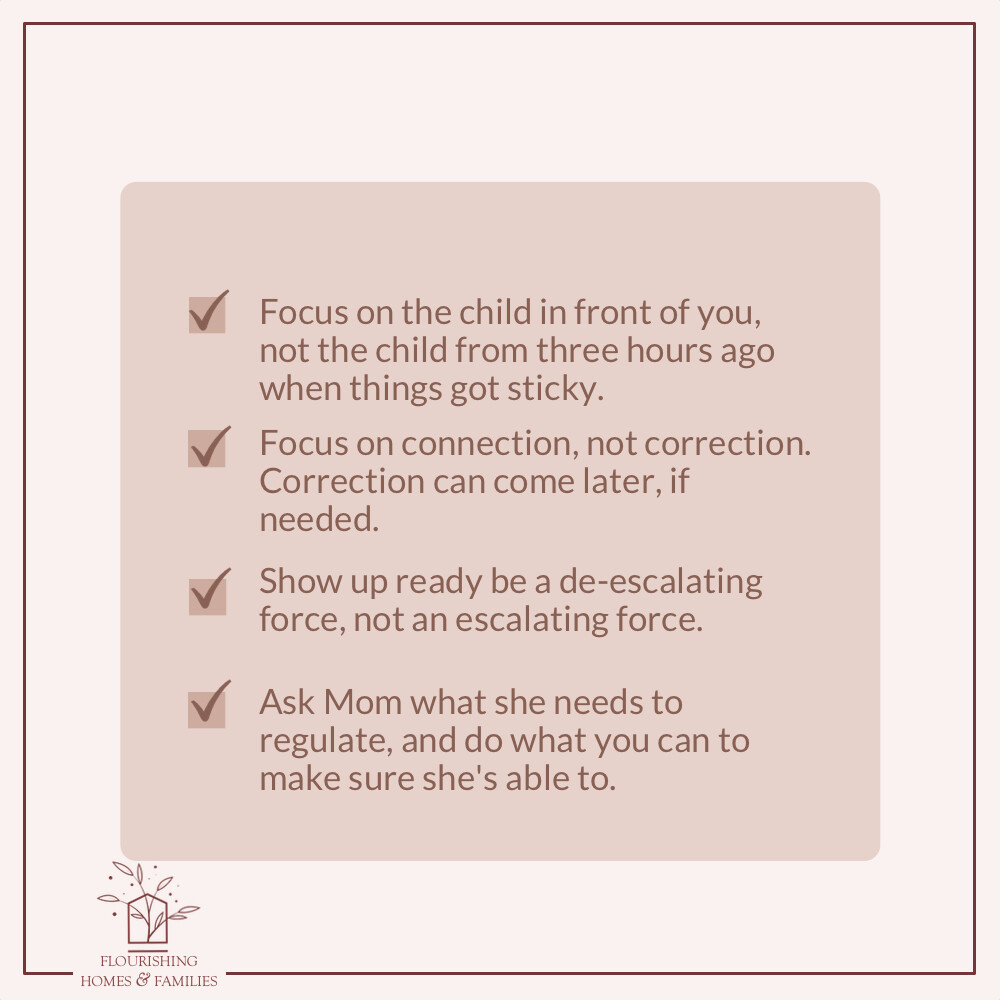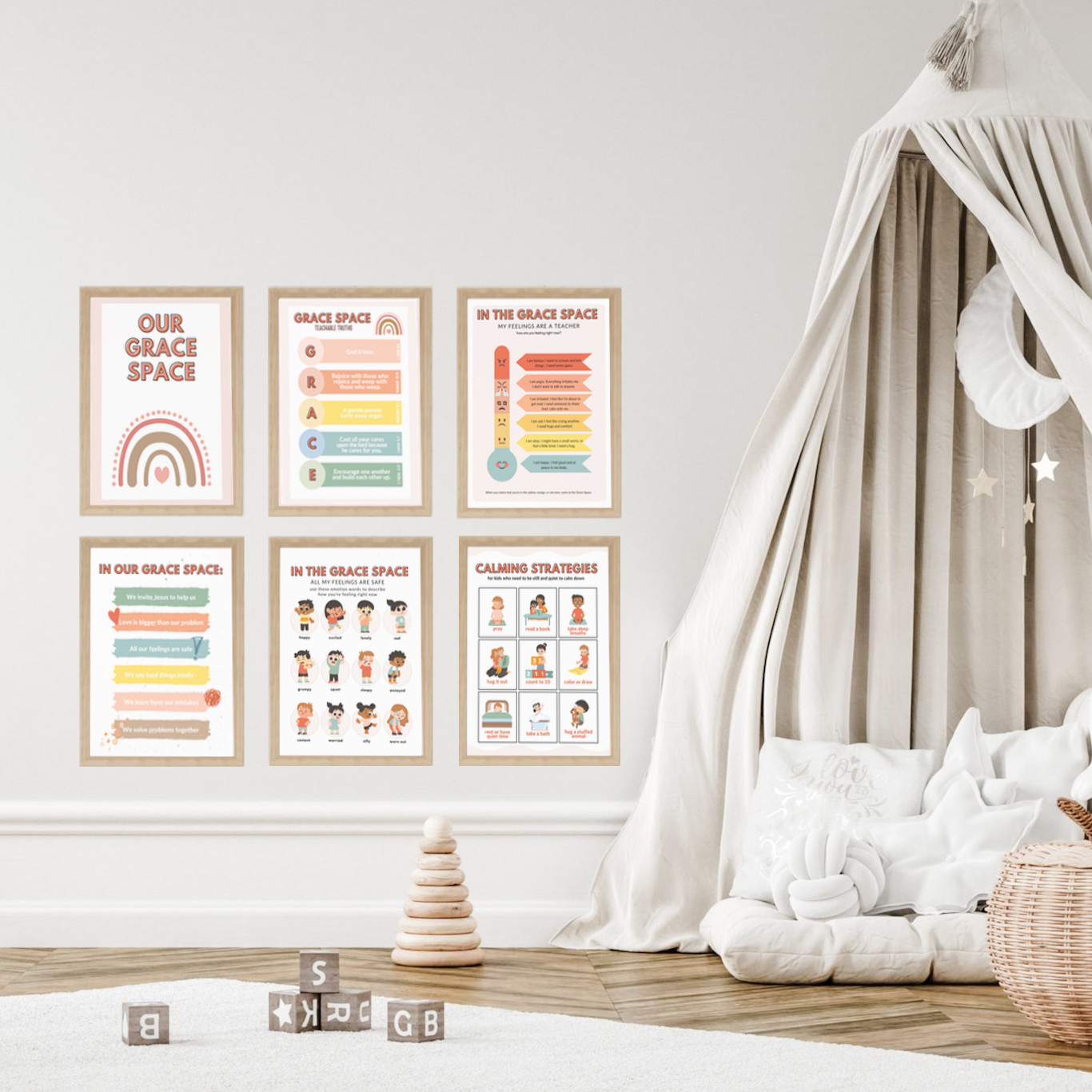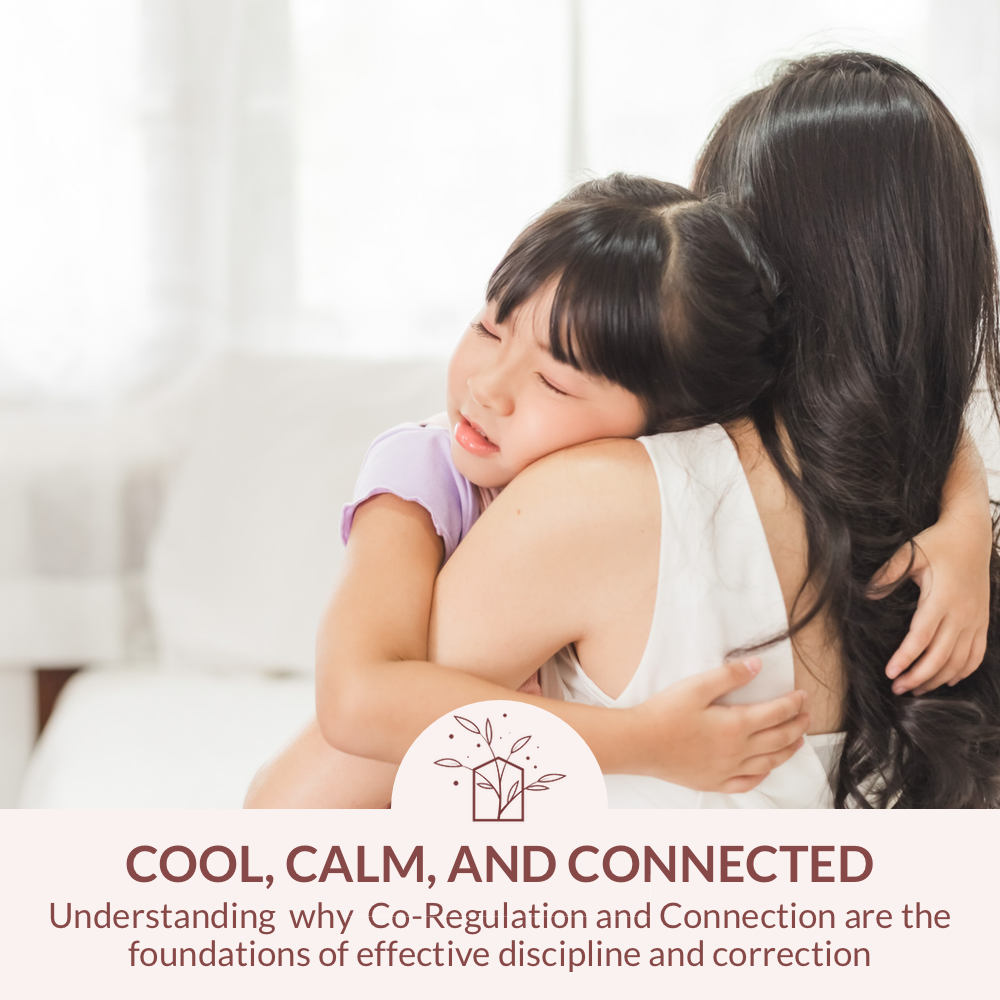
This one's for the mamas, for the ones who sometimes think, “These kids bring out the worst in me?!”
Imagine with me that your impulsive, irrational, exhausted little one is on the verge of pushing your last button. You can feel yourself about to lose your cool, and that’s when the thought crosses your mind: “Arghhhh this kid brings out the worst in me!” We’ve all been there, right? Cue the mom guilt.
This is the exact moment to practice the power of the pause. I totally get that that sounds a little whimsical and a lot cliche, neither of which are all that helpful when you’re patrolling the streets of Meltdown City. But stick with me.
See, that pause is powerful. It gives the Holy Spirit space to nudge your heart, and it gives you space to hear it. That inner voice that quietly counters your own exasperation, whispers, “Or you can choose to let him bring out the BEST in you. Patience. Kindness. Self-control. Empathy. Inner strength that he doesn’t have. You can choose to let him bring out CHRIST in you.”

Talk about powerful! In that split second, we get to choose to let our little ones bring out the worst in us or to let him bring out the BEST in us. And we get the glorious responsibility, and holy work, of choosing!
I want to encourage you today, as a mama who is in that split second of choosing way too often, to be sensitive to those tiny moments when you get to pause and choose. The most effective way our little ones will learn respect and self-control is by seeing respect and self-control in action! I’m preaching to myself here because motherhood is such an opportunity to become more like Christ, and I know I’m not alone in needing the reminder to choose well!
AND FOR WHEN YOU CAN'T CHOOSE
I also want to acknowledge the mamas who feel like they can't choose. When I was deep in postpartum anxiety I experienced rage unlike anything I've ever known. And the hardest thing was that I knew it was wrong, I wanted to change, and in some of the most triggering moments, I couldn't stop the intense reaction and anger coming out of my body. And yes, it landed all over my kids.
I completely understand that reading "You have the power to choose!" can feel disempowering because, in some of those more irrational moments, you would choose to do differently if you could. First, when you can choose, do. Practice it and start over in the middle of an outburst if you catch yourself reverting to old habits. (Neuroscience shows us that even when we start off down an old, unhelpful reaction, stopping and changing in the middle of it helps rewire our neural pathways for future growth and change!)
Secondly, consider getting help. We've shared lots of resources here and on social media. But if you're still experiencing frequent moments where you can't control yourself, please consider talking to your doctor or healthcare provider. I personally benefited greatly from talk therapy and nutritional adjustments. Sometime's Christ's work in us comes from medical and mental health professionals.
You might like:

As a parent or caregiver, it's common to feel overwhelmed and stressed. Knowing how to care for our nervous systems so that we avoid burnout and chronic dysregulation is vital not only for our own health but for our ability to help our children regulate as well. It’s often easy to know when your nervous system is activated. Some of the obvious signs are that you feel like you’re on the verge of losing it! But what does a regulated and calm nervous system actually feel like? Let’s take a look:
What is the nervous system anyway? The nervous system is a complex network of cells and nerves that move information throughout the body. When it is regulated, it functions smoothly, allowing us to feel calm, focused, and in control. In contrast, an unregulated nervous system can lead to feelings of anxiety, stress, and overwhelm. The truly remarkable thing about our nervous systems is that they not only transmit information within our own bodies, they communicate with each other's nervous systems as well! This is why some experts say that a family is one nervous system. As parents, our own nervous systems inform the nervous systems of the entire family.
What does a regulated nervous system feel like emotionally? When your nervous system is regulated, you will feel a sense of balance and equilibrium. You are able to respond appropriately to stressors without becoming overwhelmed, or over-excited, and you can recover quickly from difficult situations or stressors. While you will still experience frustration, fear, anger, and sadness, those emotions are manageable and don't interrupt your day. You're able to think clearly and make decisions with ease.
What does a regulated nervous system feel like physically? Physically, a regulated nervous system is evident in a number of ways. Your breathing will naturally be slow and deep, your heart rate will be steady, and your muscles will be relaxed. You may also feel a sense of warmth and comfort in your body (as opposed to tightness in your chest or a knot in your stomach), indicating that your parasympathetic nervous system is activated and your brain and body feel safe.
This is just a place to start. If you recognize that your nervous system is dysregulated much of the time, these ideas are just a place for you to start on the journey to learning how to regulate your brain, body, and spirit. Regulation doesn't happen overnight, and it isn't a one-and-done event. It's something you'll learn to do over and over again until your state of activation becomes fewer and farther between.
You may want to look into:
- Deep pressure
- Mindfulness
- Meditation and prayer
- Journalling
- Vagus Nerve Stimulation
- Somatic Therapy
This isn't about shaming parents who feel dysregulated most or all of the time! I've been there, and I know how hard it is. My goal is to bring awareness and practical steps you can take to nurture and support your own nervous system so you experience more peace in your body, mind, and spirit.

A note about Magneisum and Vitamin B12
Magneisum is a vital nutrient for every body system and has been found to be soothing to the nervous system. (Magnesium Glicinate or Magnesium L Threonate are the most beneficial.)
VITAMIN B12 is essential for nerve health and brain function. The human body cannot generate this, so it is important to source foods that are rich in B12 or take a Vitamin B 12 or B Complex supplement.
Want to learn more? Our Cool, Calm, and Connected workshop explores various ways to regulate your body, mind, and spirit, and will help you understand the power of co-regulation.

I want to talk a little bit about what it means to be a place of peace for your child.
Sometimes, in the trying moments, we may feel the need to step away from the situation or our child so we can calm down. We certainly all need to just take some space from the crisis sometimes. But I want to remind you that we as parents are gifted not with our own inner peace, but with the peace that comes from abiding in Christ.
“I am the vine, you are the branches; he who abides in Me and I in him, he bears much fruit, for apart from Me you can do nothing.” John 15:5
Jesus, while speaking with His disciples, spends a great deal of time explaining that the safe place for them is abiding in Him as their place of peace, ability, and safety because Jesus is abiding in the vital source of life in all its fullness–God himself.
As parents, we do not take the place of Jesus, but we do build our model after Him and we see that He offers us a space within Himself that allows vulnerability and protection.
When we understand abiding in Christ and live in this every day, we are able to be that place of peace for our children because we abide in Christ, and Christ abides in the Father. We are offering ourselves to be a link in the chain that helps connect our children with their creator.
One does not simply bounce in and out of this abiding business. It is a conscious choice–a lifestyle. But it isn't quite as easy as giving you a checklist of things to mark off to make sure you're abiding in Him. How I wish it were that easy!
Ultimately, abiding in Christ is not about doing all the things, rather it is resting in our identity in Him.
When we find our true identity in the One who created us, we are freed from misplacing our identity in the things that so quickly tempt us: how tidy our homes are, how obedient, how many Bible verses we have memorized, how much we accomplished around the house or for the Kingdom.
We do not have to strive for, work for, negotiate or argue for, defend, or take credit for Christ’s unconditional love for us.
He is just as much at work in us when we’re dancing in praise to Him as when we’re dancing around toys on the floor. His faithfulness to us is just as steadfast when we read our Bible for an hour as it is when our Bibles sit in the car forgotten since last Sunday. His peace is available to us as reliably when our children are tucked snuggly in their beds and the house is quiet as it is when chaos ensues and screaming and crying and tantrums are the soundtrack to our days.
How I wish I could give you the indescribable gift of this freedom: abiding in Christ is about His faithfulness and goodness, not about how hard we’re holding on to Him. Jesus-Centered parenting, abiding in Christ is giving radical surrender to our weakness so that we can depend wholly on His strength. The world tells us to defend, hide, be ashamed of it, and deny our weakness. Jesus invites us to welcome our it as a sacred reminder to abide in Him and His strength.
To be sure, we can develop holy habits that remind us of Christ's faithfulness. But we must recognize that these habits are about being with Him, not about doing more or trying harder.
Ultimately, as we abide in Christ we will begin to see evidence of His work in us:
The fruit of the Spirit:
One of the evidences we are abiding in Christ is by bearing fruit–we are told what some of those fruits look like. I find that being familiar with something and putting those things into practice can be two totally different things. It may be a good idea to make a chart or write them out in a place where they are continually before your eyes as you a reminder of the work He is doing in you and through you. Yes, you may have to practice gentleness and peace many times over! But the work isn't yours to do alone! But the fruit of the Spirit is love, joy, peace, patience, kindness, goodness, faithfulness, gentleness, self-control; against such things there is no law. Galatians 5:22-23
Looking for opportunities to learn from Jesus:
How do we do this? Make time to spend with Jesus. For some people that looks like taking a chunk of time in the morning to soak in the word and be in prayer. For others in more busy seasons, it may simply be taking time to pause and bring the Lord into your day, or using the chromecast to put on a scripture playlist while you’re busy at home. Whatever the case may be, abiding in Christ looks like being drawn to spend time with Jesus and learn from Him how we can put His model Kingdom way of living into practice as a parent. Take my yoke upon you. Let me teach you, because I am humble and gentle at heart, and you will find rest for your souls. Matthew 11:29
Letting the Peace of God rule in your heart:
This is simple–stop striving for peace as though it’s something you can wrestle down. Remember who the Lord is and that He is always a non-anxious presence whom you can trust. Don’t let your mind be led down all sorts of rabbit trails. Practice, instead, letting the peace of God rule in your hearts. It’s not something to force. It is something to simply allow. It may take some practice, but if Jesus told us to, I can promise you it is worth it. Let the peace of Christ rule in your hearts, to which indeed you were called in one body; and be thankful. Colossians 3:15
Your unique story needs to be told in unique ways.
God is writing the beautiful story of you. The failures, conflicts, and struggles that arise in your story are part of what makes you unique. We know that the application of the scriptures we shared may very well look a little bit different for each of us, but ultimately, they will all point to Jesus.
When we focus our energy on being peaceful, regulated, and steadfast we are able to bring those things–and Jesus– into every situation.
This abiding does not fail us because Jesus doesn’t fail us. Instead, it brings peace to the chaos and our children are able to regulate and be at peace much more easily when we are doing just that.

Do you want to know something that can really set me off as a dad? My children being disrespectful, disobedient, or rude to my wife. If there is one thing I have learned, it’s that my wife rarely needs me to defend her from the tiny people living with us. Mostly, she needs me to support her and help her during the stressful moments of parenting.
Let me tell you how that used to work out. So I’d be at work, working hard. Meanwhile, my wife is at home, tending to our little ones. Some days my wife loves being a work-at-home mom. This is not one of those days. My phone periodically buzzes with updates. She sounds increasingly frustrated and frazzled. She's trying hard not to take it out on the kids. I wish I could help her. Finally, my work day is done and I get to come home. By the time I get home, frankly, I'm a little bit peeved at my children. I walk in the door ready to lay down the law and defend my wife's honor.
I can't remember it ever working out particularly well. Mostly I just managed to add more chaos to an already chaotic day. Which meant I wasn't really the knight in shining armor I was hoping to be. Plus it wasn't doing my relationship with my children any favors. What kid is going to keep being excited that daddy is home when he often walks in door already frustrated with them?
So instead I changed what I do. I walk in the door and it's a clean slate. I try to spend a few minutes with each child, just re-connecting with them. My wife meanwhile, may have retreated behind a locked door to get a little alone time. Some days it's a re-set, and we have a wonderful evening together as a family. Some days it's a blip and we still have a hard day. But I've learned to father in the present, not trying to fix what's already in the past.

Looking for more? You might find these helpful:
 |  |  |

Whenever we ask, "what is your number one parenting trigger?" there is always a resounding response that whining definitely ranks pretty high up there. Why is whining so triggering, anyway? And what can you do about it? Here are a few tips + sample scripts to help you transform your whining trigger.
WHY IS WHINING SO TRIGGERING?
- You were shamed, silenced, or ignored when you whined as a child, your subconscious brain may associate whining with neglect or emotional abuse.
- You perceive whining to be a character flaw, sin, or grab for attention, or misbehavior instead of the developmentally normal communication that it is.
- You genuinely desire for your child to be happy, and when they whine you feel insufficient as a parent because they clearly are not happy.
- You feel out of control when your child whines, and that causes you to feel anxious and stressed.
THREE STEPS TO TAKE TO TRANSFORM THE WHINING TRIGGER
- UNDERSTAND THAT IT IS DEVELOPMENTALLY APPROPRIATE - Research indicates that whining, just like crying, is simply a way for young children to communicate sadness, distress, or disappointment. Whining peaks between 2 and 4 years of age, just when a child is starting to become verbal, but has not yet acquired the vocabulary to express their feelings. Beyond the age of 4 whining is still a natural response to strong emotions and children may whine when they are overwhelmed, anxious, tired, hungry, or experiencing dysregulation.
- RECOGNIZE THAT YOUR FEELINGS ARE TIED TO THE PAST, NOT THE PRESENT - Dr. Laura Markham of Aha! Parenting describes a trigger as "anything you experience in the present moment that activates a feeling from the past." When you feel triggered by whining, it is an activation of a wound or internalized belief from your childhood. You can determine the specific feelings it brings up, but common ones are feeling disrespected, unheard, unimportant, etc. What happens when a child feels unimportant or disrespected? They feel angry and defensive. Chances
are, those are the same feelings you experience when you're triggered now. - PLAN AND PRACTICE A NEW RESPONSE TO WHINING - Whatever your current reaction to
merely a program that your brain accesses automatically. You can write a new program for your brain, and with time and practice it will become your new response. The more you practice the new response, the more your brain will automatically access that new program when you hear whining. Try writing a few scripts to rehearse in the shower, the car, or as you fall asleep at night. And don't worry, your child will give you real-time practice opportunities as well!
PEACEMAKING RESPONSES TO WHINING
These responses are meant to guide you as you find the right response for your family. Sample scripts can be incredibly helpful, but remember that you and your child have a unique relationship with unique needs. If these don't fit your personality, or if your child doesn't respond well, switch it up and find what works for you!
"It sounds like you're having a tough time right now. What's up?"
It seems like you're feeling whiny and sad, is that right? Do you need to cuddle or have a good cry? I'm right here to hold you.
I can tell you really want to be heard. Your words are important to me and it is hard for me to understand you. Why don't you use your regular voice? It helps me understand you better.
It sounds like you're feeling upset or overwhelmed, is that right? I have enough calm to share with you. Let's take a break and talk about this in a bit.
Can you whisper that in my ear?
Struggling to get control of your own parenting triggers? Our Transform Your Parenting Triggers can help you understand what's going on beneath the surface, discover regulating strategies that will help you stay and return to calm, and help you create new, gracious responses to common struggles. Learn more here.













